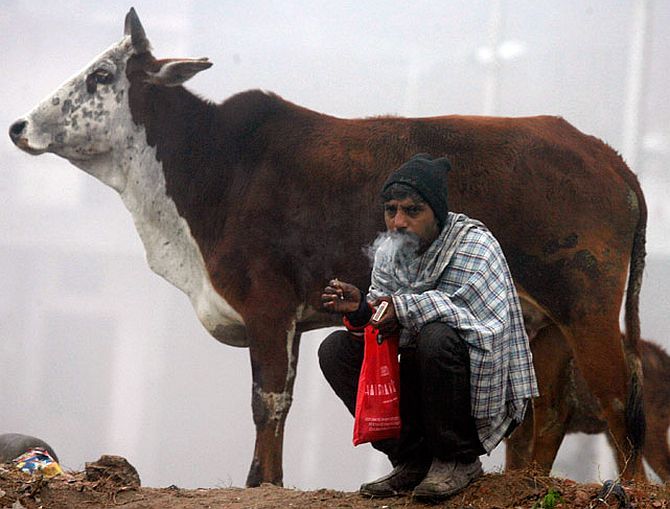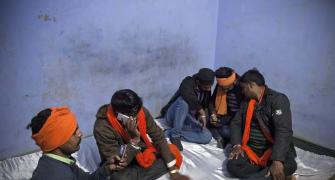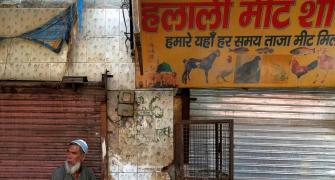
After its proposal to make floor cleaners using cow urine, the Uttar Pradesh government has decided to give a push to the use of cow urine in preparing medicines.
"The Ayurveda department has prepared eight medicines using gau mutra (cow urine) which can prove to be useful in case of liver ailments, joint pain and immunity deficiency," the department’s director Dr RR Chaudhary said.
"The department, which has two pharmacies (in Lucknow and Pilibhit) along with other private units, is preparing Ayurvedic medicines using cow urine, cow milk and ghee," he said.
There are eight Ayurvedic medical colleges in the state in Banda, Jhansi, Muzaffarnagar, Allahabad, Varanasi, Bareilly, Lucknow and Pilibhit.
"In these medical colleges, degree course in ayurvedic medicine is imparted. Along with this, in these medical colleges, everyday thousands of patients come for treatment.
"In Lucknow alone, the daily footfall in the OPD of the Ayurveda Hospital is around 700 to 800. If the all patients arriving in eight medical colleges are combined together, then the figure reaches thousands," Chaudhary said.
Elaborating on the benefits of Ayurveda, the director said, "Gau mutra is an integral part of Ayurveda, and there are eight medicines, which are made using cow urine and other cow products.
"New research show that cow urine and other cow derivatives can prove to be highly useful. Till now, we have been giving medicines made using cow urine in cases pertaining to liver ailments, joint pain and for boosting immunity. Our endeavour is to expand the ambit of these medicines and use it for curing other ailments and diseases as well," he said.
He said since there are only two government pharmacies in UP, there is comparatively less production at the government level.
"However, in the private sector, there are many companies engaged in manufacturing medicines using cow urine, which are supplied to Ayurvedic medical colleges of the state," Chaudhary said.
The director said the department is working to open newpharmacies and start post-graduate and MD courses in Ayurvedic medical colleges.
In August last year, the Adityanath government had proposed use of cow urine in making floor cleaners.
In July 2017, the Centre set up a 19-member panel, including three members linked to the Rashtriya Swayamsevak Sangh and the Vishva Hindu Parishad, to carry out what it said will be scientifically validated research on cow derivatives including urine, and their benefits, according to an inter-departmental circular and members of the panel.
Headed by Union Science and Technology Minister Harsh Vardhan, the committee was mandated to select projects that can help scientifically validate benefits of panchgavya -- the concoction of cow dung, cow urine, milk, curd and ghee -- in various spheres such as nutrition, health and agriculture, the circular says.
Named the National Steering Committee, the panel includes secretaries of departments of Science and Technology, Biotechnology, Ministry of New and Renewable Energy, and scientists from the Indian Institute of Technology, Delhi.
It also has three members of Vigyan Bharti and Gau Vigyan Anusandhan Kendra, outfits affiliated to the RSS and the VHP.
According to the government note, former Council for Scientific and Industrial Research Director RA Mashelkar, known for vigorously campaigning against US patents on turmeric and basmati rice, is a member of the panel. Others include IIT-Delhi director Prof V Ramgopal Rao and Prof VK Vijay of the IIT’s Centre for Rural Development and Technology.
The government has given the project the acronym SVAROP, which stands for Scientific Validation and Research on Panchagavya, and says it is a “national programme” that is being conducted by the Department of Science and Technology, Department of Bio-technology, and the Council for Scientific and Industrial Research of the Ministry of Science and Technology in collaboration with IIT-Delhi.
The document also says “this multi-disciplinary programme” will involve participation of other related ministries, government departments, academic institutions, research laboratories, voluntary organisations and others “to carry out research and development and also build capacities, and cover five thematic areas including scientific validation of uniqueness of indigenous cows.”
It will cover “scientific validation of ‘panchagavya’ for medicines and health, scientific validation of ‘panchagavya’ and its products for agriculture applications, scientific validation of ‘panchagavya’ for food and nutrition,” the circular said.
Vijay Bhatkar, president of the Delhi-based Vigyan Bharti, an RSS-affiliated science body, is the co-chairman of the committee.
The Adityanath government has also cleared setting up 1000-capacity gaushalas (cow-shelters) in seven districts of the state and 16 urban locations in phase one of a giant project which could see the UP government help build such shelters in every block of the state.
The government will help build these new cow shelters with proper sheds and boundary walls and a committee under the district collector is being set up to maintain them with help of NGOs and public.
Focus is first on the seven districts in Bundelkhand where cows will get shelter in the new cow-shelters.
New cow-shelters in urban areas will result in better sanitation and less incidents of cows dying due to eating plastic.
The UP government is also planning to free up its own land from illegal encroachment to set up these new cow- shelters in "safe locations" and with full facility for fodder and water.









